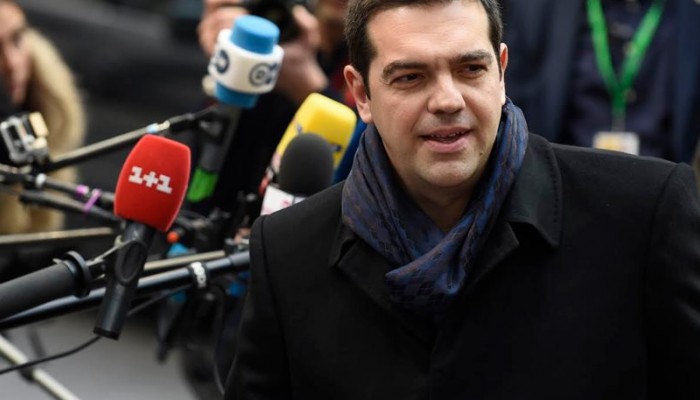Peter Spiegel, Christian Oliver and Alex Barker in Brussels, Financial Times
Greece’s prime minister agreed to speed up his economic reform plans but failed to secure any short-term financing for his cash-strapped government at a meeting with German and French counterparts and EU leaders late on the sidelines of a summit in Brussels.
The agreement with Alexis Tsipras did not change the terms of a deal reached a month ago with eurozone finance ministers, which has floundered amid Greek objections to detailed talks with bailout monitors in Athens.
But EU leaders said they hoped the three-hour discussion at the highest level would provide the needed spark for Greek authorities to co-operate more fully with the fact-finding team in Athens, which must sign off on a final list of reforms that Mr Tsipras vowed to present in a matter of days. Only when the list is agreed and the reforms implemented will bailout cash be released.
“The Greek prime minister declared he is willing to submit such a list and do so quickly,” said German Chancellor Angela Merkel, who met Mr Tsipras along with French President François Hollande, European Central Bank chief Mario Draghi and the presidents of the European Commission, European Council and the eurogroup of finance ministers. “That is needed urgently, and it is needed to focus minds.”
Mr Hollande said that “there was no more time to lose” in implementing reforms.
Mr Tsipras said he was more optimistic after the discussions, noting the agreement would allow Athens to submit its own list of reforms. “All the sides confirmed their intention to try to do their best to overcome the difficulties of the Greek economy as soon as possible,” he said.
Under the February deal, the final list of reforms was due to be agreed by the end of April, so Mr Tsipras’s agreement to submit a complete list in the near term appears to speed up the process by a few weeks.
But several of the bailout monitors — particularly the ECB and the International Monetary Fund — have found Greece’s initial reform lists severely lacking. Eurozone officials remain worried that Athens is not committed to agreeing reforms acceptable to its international creditors.
A short statement released by the heads of the Brussels institutions in attendance — Jean-Claude Juncker of the European Commission, Donald Tusk of the European Council and Jeroen Dijsselbloem of the eurogroup — said all sides had reconfirmed their commitment to last month’s eurogroup deal and vowed to “to speed up the work and conclude it as fast as possible”.
Ms Merkel acknowledged that despite the longer than expected session that stretched into the early hours of Friday, the terms of how Greece would receive rescue funding remained the same — despite “certain disappointment” that the February deal had not yet progressed towards a disbursement.
“Nothing has been changed,” she said. “It may well be you have heard this before but not all of it has happened in the last few weeks.”
Without any change in the bailout’s substance or procedures, the focus returns to Athens, where talks between the government and bailout monitors broke off on Tuesday after Greek authorities vowed to press for more favourable terms in Brussels.
The lack of progress and the mounting evidence of a cash shortage have helped restart large-scale withdrawals from Greek bank accounts, renewing fears that continued uncertainty could lead to a bank run. On Wednesday, between €300m and €400m was pulled out by depositors, the largest withdrawals since the February deal was reached.
According to officials briefed on the meeting, Mr Tsipras reiterated his public charge that the ECB was strangling the Greek economy by stopping the government raising short-term funds by issuing more Treasury bills, which are now being purchased almost exclusively by Greek banks.
Mr Draghi countered that the ECB was providing more than €100bn in emergency loans to Greek banks already, but that EU law prevented those loans to be used to purchase additional T-bills.
Mr Tsipras also attempted to win a commitment from EU leaders to allow a portion of the remaining €7.2bn — €1.8bn in profits on Greek bonds purchased by the ECB in 2010 — to be disbursed quickly if it implemented a portion of the required reforms.
Ms Merkel objected to the idea, however, and in her post-summit news conference said the profits would only be distributed when the entire package of reforms had been adopted.









